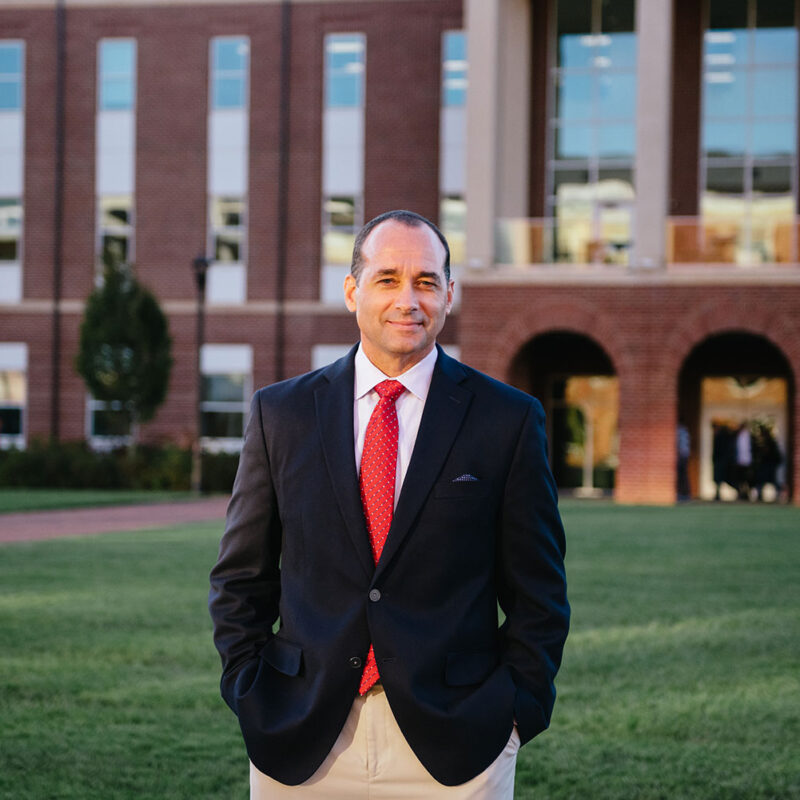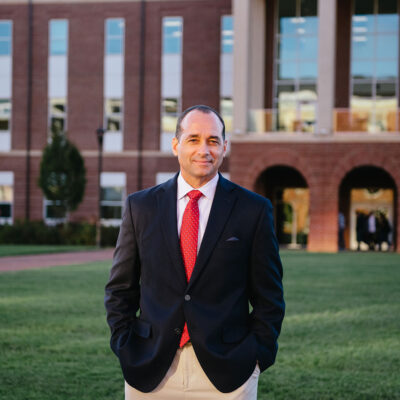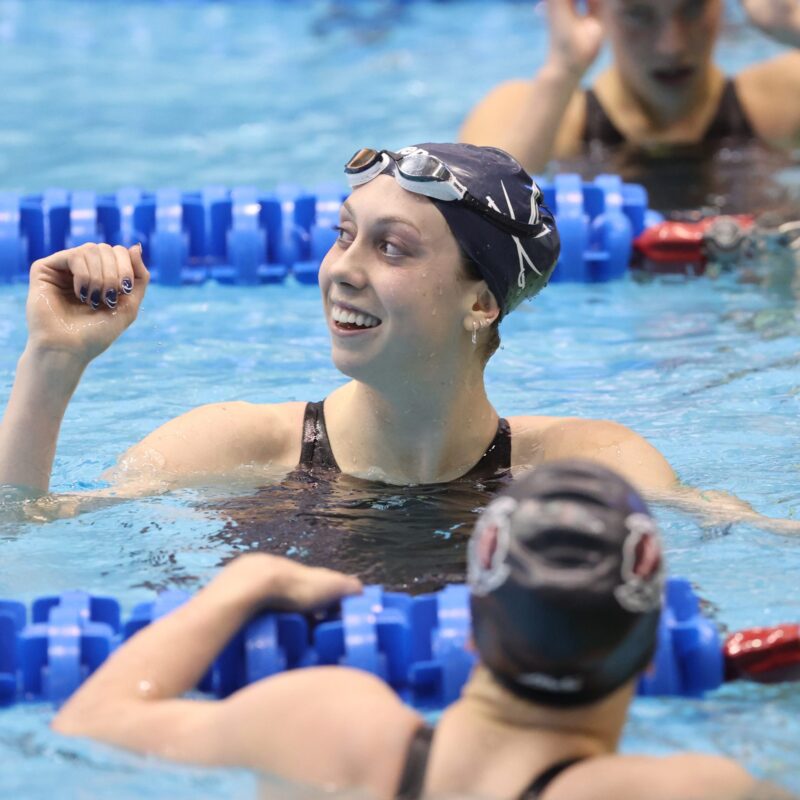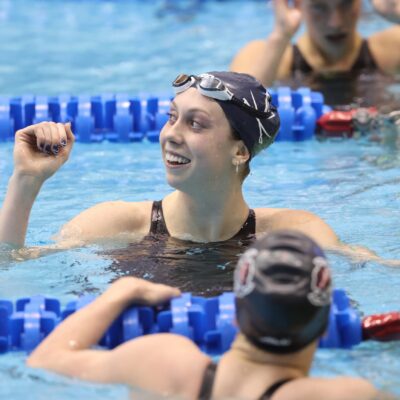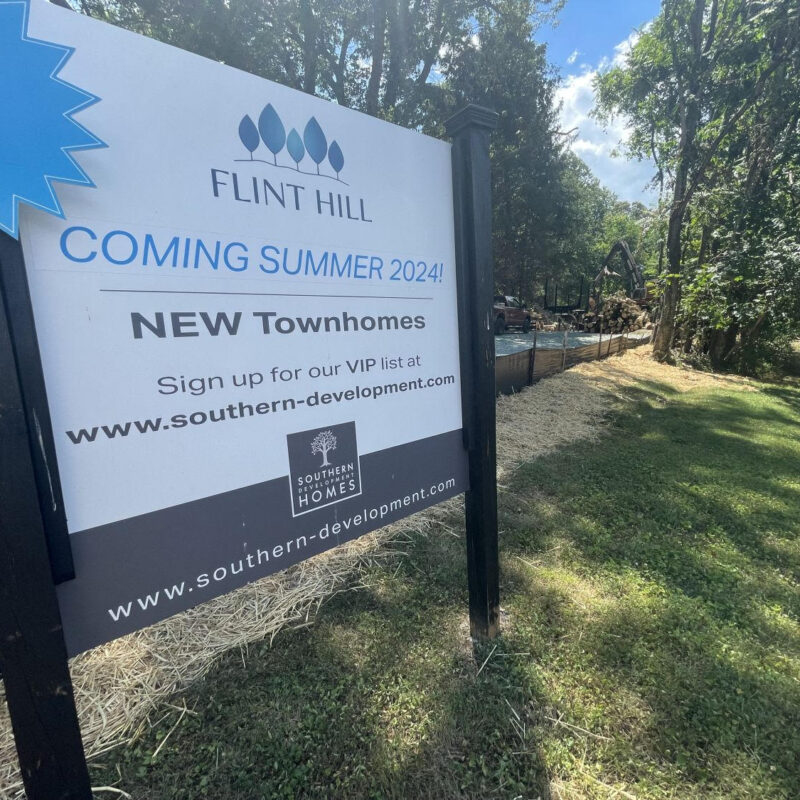Near the end of a May 5 vigil that gathered thousands from the UVA community to mourn the death two days earlier of fourth-year student Yeardley Love, Student Council President Colin Hood called for a moment of silence. For precisely 27 seconds, all the ambient noise of the vigil—the sobs of some, the whispered conversations of others—was completely quieted.
Silence has defined the week surrounding the death of Love, a UVA lacrosse player, and the almost immediate arrest of her former boyfriend, UVA lacrosse player and fourth-year student George Huguely. He is charged with first-degree murder in her death. Many students and faculty members have stayed quiet in the midst of an unprecedented surge of media attention—out of respect for Love’s family or for reasons of their own. But UVA officials have focused on another kind of silence. They’ve lamented their ignorance of Huguely’s violent history, while urging students to speak up if they perceive abuse or are subject to it themselves.
“Take something away from this event tonight,” said UVA President John Casteen, audibly choked up during the vigil. “Take with you the determination that you must speak up for yourself, that you will act when you see or hear about abuse or violence in the world around you.” While UVA regains its voice, Love’s death demands answers to hard questions—about Huguely’s prior episodes, about alcohol abuse, about abusive relationships, as well as the cultures of sports, school and silence.
Love’s death, Huguely’s admissions
On May 3 at 2:15am, Charlottesville Police responded to a call of a possible alcohol overdose at 222 14th Street NW. When officers arrived at her apartment, they found Love unresponsive. She was pronounced dead on the scene after several unsuccessful attempts to revive her. The same morning, Huguely was taken into custody and charged with first-degree murder. He is currently being held at the Albemarle-Charlottesville Regional Jail.
According to affidavits, Love was found by a roommate in her bedroom, face down, with a pool of blood on her pillow. Court records show that Love had a large bruise on the right side of her face. Her right eye was swollen shut, and bruises and scrapes were found on her chin.
|
In a high school essay reprinted in her funeral program, Love wrote that one of her three wishes was to attend UVA. |
In the affidavits, Huguely admitted to having an altercation with Love, kicking the door and shaking her against the wall “repeatedly.” The documents also reveal that the door to her room had a hole in it; the reporting officer observed “injuries on the right leg of Huguely that are consistent with kicking an object, such as a door.” Huguely told police that he and Love communicated via e-mail, and admitted to taking Love’s computer from her apartment to later dispose of it. Once in custody, he gave the location of the computer to police; its contents were not released by press time.
City spokesperson Ric Barrick says Huguely met with police detectives at his apartment, a short walk from Love’s residence, and “he voluntarily came into the police department when asked to come in for more questioning.”
“He was upset by the situation he found himself in, but was cooperative with police,” said Barrick in an e-mail.
On Tuesday, May 4, Huguely appeared in the Charlottesville General District Court via videoconference from the regional jail, dressed in a black-and-white uniform. He sat quietly while his lawyers, Francis McQ. Lawrence and Rhonda Quagliana, set a control date for June 10 to deal with additional findings that might surface in the homicide investigation. Huguely’s mother, father and stepfather attended the bond hearing, and exited without comment.
After the hearing, Lawrence read a statement on behalf of Huguely and his family. “Ms. Love’s death was not intended, but an accident with a tragic outcome. In the meantime, George is withdrawing from the University of Virginia and remains in the custody of authorities,” he said.
The same day, medical examiners completed Love’s autopsy and returned her body to her family. A cause of death has not been released. Stephen Murman, director of the central office for the Virginia Chief Medical Examiner, told C-VILLE that a cause of death could take weeks if additional reports, from toxicology studies to tissue samples, are conducted.
Last Tuesday, when asked whether alcohol or drugs possibly played a role in Love’s death, City Police Chief Tim Longo said, “We don’t know, at this point, what relationship, if at all, drugs or alcohol may have had with respect to the defendant or the victim.”
"One of our own"
Love is the seventh UVA student to die during this academic year. Her death came less than three days after a memorial service for the six students who died between November 2009 and April 2010—John Jones, Justin Key, Stephanie Jean-Charles, Scott May, Joseph Arwood and Matthew King.
Love’s death is the first this year to implicate another student as the alleged attacker. UVA Chief Operating Officer Leonard Sandridge, noting that the entire University is in shock, said the disappointment came from knowing that Love “was murdered by one of our own.”
|
Charlottesville police officers outside of Love’s apartment building on 14th Street, not far from Huguely’s residence. According to reports, law enforcement recovered a red-stained shirt from Huguely’s apartment. |
As Casteen put it during a press conference, “There is no protocol to deal with this kind of death”—a statement that largely seemed to explain the silence at UVA. As reporters from the New York Times and Washington Post to the Associated Press and ESPN descended upon the University, many on campus remained quiet concerning the event.
Tuesday, May 4, marked the final day of classes at UVA. When approached by a reporter, students on the UVA Lawn repeatedly declined to comment about Love, Huguely, or the feelings around grounds; a member of the Kappa Alpha Theta sorority, where Love was a member, said that Love’s family asked that the sorority not comment.
The silence also extended to 14th Street NW—a half-mile mix of residences, restaurants, bars and retail spots that sees heavy student traffic. Both Love and Huguely lived on the street: Love’s second-floor apartment features a glass sliding door that faces in the direction of Huguely’s, a red brick building. The door to Huguely’s apartment is less than 100 steps from the stairwell that leads to Love’s front door.
Boylan Heights, a “gourmet burger bar,” sits at the corner of 14th Street and University Avenue. Brett Harder, a Boylan employee, says that both UVA lacrosse teams would visit the bar, with some of the men’s team visiting as often as “three or four days a week.”
“They usually come in about midnight. They’re usually pretty drunk when they get here, because they’ve been pregaming all afternoon,” says Harder. “They hang out. Each of them will have a couple rounds, a couple shots. And then they usually roll out about the time we have to throw ’em out.”
Although the status of their relationship was unclear to him, Harder says he’d see both Huguely and Love at Boylan. “Occasionally I’d see them together,” he said. “Most of the time, I’d see them with their respective friends.” A second Boylan Heights employee, a fourth-year student at UVA, said she knew Huguely from the restaurant and had met him there, but was not at the bar on Sunday, and did not know whether Huguely or Love had been to Boylan that night.
Asked whether Huguely was well-liked, she responded that she didn’t know him well, and was “kind of sick of talking about it.” She’d been interviewed three times that day, she said.
Gaps in the situation
To what degree is heavy drinking a part of the lacrosse culture? When the Washington Post spoke with UVA men’s lacrosse coach Dom Starsia in 1999 about the team’s one-night-per-week drinking limit, Starsia remarked that the sport went “hand-in-hand” with alcohol.
“Whether it is post-game celebrations or just in general, there was something about the sport and alcohol, and Virginia was no different,” Starsia told the Post. He added that he “always thought alcohol was an issue here.”
However, in the wake of Love’s death, the surge of reports concerning both alcohol-related incidents among UVA men’s lacrosse team members and Huguely’s violent past suggests a systemic or cultural disconnect between the actions of students and the reaction of university officials.
|
Huguely appeared voluntarily at the police department when asked to answer further questions, said city spokesman Ric Barrick: “He was upset by the situation he found himself in, but was cooperative with police.” |
By Wednesday, May 5, news emerged regarding prior alcohol-related charges against numerous members of the UVA men’s lacrosse team. Those charges include use of a fake ID and possession and purchase of alcohol while underage. Most charges were filed between the summer of 2007 and fall of 2009; those charged with alcohol-related offenses were UVA students at the time they were charged. While some players were ultimately cleared of charges, others were convicted, including Huguely.
In 2008, Huguely pleaded guilty to charges of public intoxication and resisting arrest in Lexington, Virginia. On the night of November 14, 2008, police officers responded to a 911 call in the area of Jefferson Street.
“Upon arrival, they observed George Huguely and he appeared to be inebriated,” Lexington Police Chief Al Thomas told C-VILLE. “He actually stumbled into incoming traffic.”
Thomas said Huguely became “combative” and “began shouting obscenities” towards a female officer when placed under arrest. The arresting officer “deployed her Taser in order to gain control of Mr. Huguely, and he was taken into custody without further incident,” said Thomas.
However, Huguely’s combative behavior didn’t stop there. On December 29, 2008, Florida police responded to a domestic disturbance aboard the Huguely family yacht. The report was filed by Huguely’s father against his son, who had jumped into the ocean, threatening to swim to shore; ultimately, no arrest was made.
On the evening of Wednesday, May 5—an hour before the vigil held for Love—Casteen, Athletics Director Craig Littlepage, Dean of Students Allen Groves and Chief Student Affairs Officer Patricia Lampkin met with press at the Small Special Collections Library. The four answered questions that focused mainly on what Casteen called a “number of gaps in this situation.” Chief among those gaps was prior knowledge of Huguely’s 2008 conviction.
After Casteen learned that neither the UVA police department nor lacrosse coaches had any knowledge of a prior conviction for Huguely, he asked staff whether students were required to self-report “any arrests [or convictions].”
“And there is, in fact, a regulation in the student code of regulations that requires that kind of report,” said Casteen—meaning, evidently, that students are expected to incriminate themselves.
As to how the athletics department handles alcohol incidents, Littlepage said, “We don’t permit, by policy, illegal consumption of alcohol.” Student-athletes also consent to random drug tests; if found in violation, they are immediately suspended from the team and must meet with counselors through the university before being granted a chance to return to play, provided coaches agree.
But what about incidents involving of-age drinkers, like Huguely, who is now 22? Littlepage said that any student who has an alcohol-related incident is “required by policy to be referred to a counselor in the university’s counseling center.
“This assumes that the alcohol incident had some level of legal consequence,” said Littlepage. “They got into a fight, they were driving while intoxicated…” Which suggests that, without an official “public intoxication” or DWI charges, alcohol-related incidents can go unchecked.
|
Thousands from the UVA community attended a candlelight vigil for Love last week. “If you fear for yourself, or for others, any form of violence, act,” UVA President John Casteen told the crowd. |
And what of incidents of violence? A source close to UVA athletics says Huguely blackened the eye of a teammate in an incident over a girl. The Washington Post reported something similar late last week, after former UVA lacrosse players told the Post that, in February 2009, Huguely attacked a teammate who he heard had kissed Love.
The Post added that “It was not clear if Starsia reported the incident…to any of his superiors at UVA.” Starsia has not yet commented on Love’s death; his father, 86-year-old Dominic Starsia, died on the same day the Post reported Huguely’s 2009 attack.
UVA officials were also asked about a rumored confrontation between Huguely and Love at the Delta Kappa Epsilon fraternity house. Groves said he had no knowledge of the alleged incident. Casteen added, “I read the police reports each morning. And that incident has not appeared in any reports.”
Looking forward, Littlepage said that both lacrosse teams expected to play in the NCAA tournament, and Casteen confirmed that Love would be posthumously awarded a degree from UVA. The decision to continue the lacrosse season has been met with considerable controversy.
“The fact that this was not [Huguely’s] first violent interaction with Love is the strongest charge against the friends and teammates that failed to recognize the severity of the situation,” wrote Brian Till in The Atlantic.
“The story of Love’s senseless death will rightfully dominate post-season coverage of both the men’s and women’s tournaments,” wrote Till. “And images of the men’s team hoisting trophies and one another aloft on the heels of this tragedy would leave many, including those well outside the UVA community, with a bitter taste.”
Last weekend, a funeral service for Love at the Cathedral of Mary Our Queen in Baltimore, Maryland, attracted thousands of mourners, including UVA women’s lacrosse coach Julie Myers. Some from the UVA men’s lacrosse team served as pallbearers for the service.
“I think both teams are in a great deal of pain and both teams are trying to sort this out the best they can,” Starsia told The New York Times.
Most at-risk, most silent
Friday, May 14, marks the last day of final exams at UVA. On Saturday, the NCAA men’s lacrosse tournament begins, followed by the start of the women’s tournament on Sunday and, on May 23, the graduation of the Class of 2010—now absent two students.
|
Huguely’s lawyers, Rhonda Quagliana and Francis McQ. Lawrence, outside the Charlottesville General District Court. Lawrence read a statement on behalf of Huguely that called Love’s death “an accident with a tragic outcome.” |
Claire Kaplan, the director of Domestic and Sexual Violence Services at UVA Women’s Center, spoke with C-VILLE about instances of “intimate partner violence” among high school and college students. “Usually, the ages of 16 to 24 are the most at risk for abuse in a relationship,” says Kaplan. “Given their ages and their developmental status, they are also the most silent.”
Kaplan added that the Women’s Center offers a panel each October for student survivors of intimate partner violence to share their experiences.
“It’s important that you not be silent, that you tell people around you, but also understand that your friends may not have the information you may need,” says Kaplan. “They are important for supporting you…but it is also important to know that you need to tell someone who has the capacity, the knowledge and the authority to take action and to ensure your safety.”—Brendan Fitzgerald and Chiara Canzi
C-VILLE welcomes news tips from readers. Send them to news@c-ville.com.





